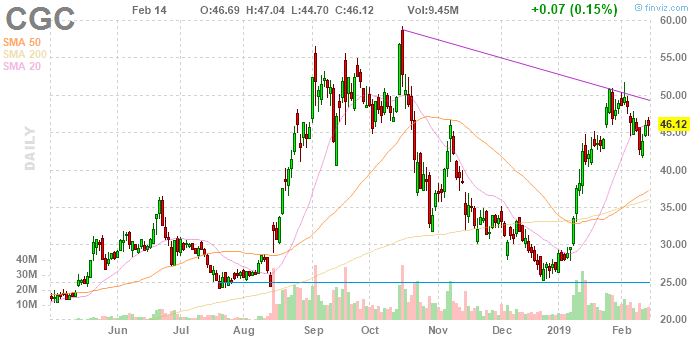Late Thursday evening, cannabis stock Canopy Growth Corp (NYSE: CGC; TSX: WEED) reported fiscal Q3 earnings – apparently to limit the amount of time and news stories between the earnings release and the Friday morning premarket conference call. Despite missing profit expectations, investors seem to be relieved by the sales numbers (supported by sales of legal marijuana in Canada) as revenue grew from $21.7 million to $83.0 million from the year-earlier period on 10,102 kilograms of pot and equivalents being sold versus just 2,330 kilos in the year-ago quarter. Average price per gram was $7.33 versus $8.30 in the year-ago quarter.
However, sales and market costs skyrocketed to $44.9 million from $9.4 million in the year-earlier period while general and administrative costs grew to $46.1 million from $11.1 million and share-based compensation expense grew to $63.9 million from $17.9 million. Net income was $74.9 million compared with $11.0 million in the prior year thanks to other income of $235.2 million that was primarily made up of fair value changes on financial assets and financial liabilities. Cash stood at nearly $4.915 billion thanks to a huge investment in the Company last year by Constellation Brands (NYSE: STZ).
Chairman & Co-CEO Bruce Linton was quoted in the earnings release as saying:
"Our successful first full quarter with recreational sales in Canada reinforces our long held strategy of making meaningful investments early in order to secure market share. With a strong cash position, we added strategic assets and IP through acquisitions to accelerate the sophistication of our inputs with ebbu, and our consumer-facing outputs with Storz and Bickel."
"The Canadian recreational cannabis market will be dominated in the long term by businesses delivering excellent products and consumer experiences. Sales from the first wave of products and retail environments launched in the third quarter demonstrate that we are capturing consumers' attention."
"We have developed an unprecedented and unparalleled fully integrated platform at scale and will continue to expand by making strategic production investments in regions with federally permissible paths to market for our cannabis and hemp offerings. We believe this strategy will develop a significant and sustained return on invested capital over the long-term."
Canopy Growth Corp also said its CFO plans to retire in mid-to-late 2019.
Before earnings, its worth quoting Mad Money's Jim Cramer who commented that Canopy Growth Corp is in spending mode (thanks to the strong balance sheet) and wants to dominate the cannabis industry by being that industry's Coca-Cola (in fact, the Company is in a race to come up with cannabis infused beverages – the whole point of the Constellation deal). This means that investors may overlook the rising expenses and paper losses along with the CFO leaving albeit Cowen analyst Vivien Azer has already expressed concern about margins in a note earlier today:
"WEED net revenues of $83 mm were up 256% sequentially, and in line with consensus, which is a relief given the meaningful miss last quarter. The offset, however, seems to be an absence of production efficiencies as cash COGS (cost of goods sold) / gram continued to climb, and was $5.11 in the quarter, a far cry from the $2-3 we see from WEED's peers."
And:
"While industry disclosure around gross margin can vary from company to company, for Canopy, cash cost of goods sold per gram of $5.11 looks to be meaningfully higher than its peers, having climbed 15 percent sequentially."
Nevertheless, overall industry and idividual company growth will ultimately be determined by regulation in key markets like the USA where cannabis is banned nationally; but available for controlled use in select states. US banks cannot offer services to marijuana-related businesses without the risk of prosecution - leaving operations in states where the drug is legal to rely on cash.
On the other hand, the $867 billion farm bill signed into law in December included a provision for industrial hemp legalization. The provision removed industrial hemp from the federal government's list of controlled substances, making it a lawful agricultural commodity. This means that cannabidiol (CBD) can now be extracted from hemp in the United States. However, how the compound is consumed remains a point of confusion for many regulatory and law enforcement agencies with the US FDA still prohibiting companies from adding the active ingredients in drug products to foods and beverages.
Canopy Growth Corp was also granted a license by New York state to process and produce hemp and the Company plans to invest between $100 million and $150 million in its New York operations that will likely be located in close proximity to the operations of Constellation Brands.
A technical chart does show conflicting trends; but shares were rising almost 5% in trading after the market opened:

No comments:
Post a Comment